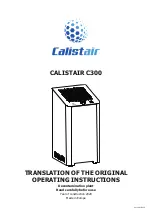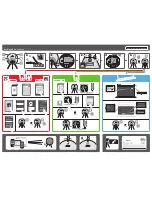
17
2.0 Service
2.6 Hydraulic Power Unit
Daily (every 5 hours of use):
1.
Check oil level.
2.
Inspect for oil leaks and repair as necessary.
3.
Check all hoses, fittings, bolts and hardware to make sure that they are secure and properly tightened.
4.
Check motor oil level. See Engine operator’s manual for details on oil levels, oil types, and service
intervals.
Once per season (every 20-25 hours of use):
Change hydraulic oil filter element with either a NAPA 155Z or a FRAM P1654A Filter.
Every two to three years (every 75-80 hours of use):
Drain oil reservoir and refill with clean, good quality hydraulic AW 32 oil. (It is not recommended to refill
with tractor hydraulic oil).
Replacing hydraulic parts:
Check parts section for proper part description and part # for replacement.
Purge air from system as follows:
1.
Disconnect the rod end clevis of all cylinders in a circuit and block up cylinders so the rod can completely
extend and retract without contacting any other components.
2.
Pressurize the system and maintain system at full pressure for at least 5 sec. after cylinder rods stop
moving. Check that all cylinders have fully extended or retracted.
3.
Check hydraulic reservoir and refill as needed.
4.
Pressurize system again to reverse the motion of step 2. Maintain pressure on system for at least 5 sec.
after cylinder rods stop moving. Check that cylinders have fully extended or retracted.
5.
Check for hydraulic leaks using cardboard or wood. Tighten connections according to directions torque
chart.
6.
Repeat steps 2, 3, 4 and 5 (3 to 4 times).
7.
Depressurize hydraulic system and connect cylinder rod clevises to their mating lugs.
2.7 Conveyer Belt Tracking
Conveyor belt must run in the center of the pulley at both the discharge end and the collapsible hopper end. Fail-
ure to do so will lead to unnecessary wear and shortening of belt life. We recommend that you check your belt for
proper tracking every 10 hours of use and before every season.
Checking the belt tracking at collapsible hopper end:
1.
Open clean out-door located under collapsible hopper (Figure 2.4). This will allow you to see if the
belt is centered on the pulley.
2.
If the tracking is ok, close the clean out-door. If tracking is off, see (Section 2.8).
Checking the belt tracking at discharge end:
1.
Remove the 12 bolts located at the discharge end (Figure 2.3).
2.
Remove the Discharge Pan and Rubber Discharge Pan. This will allow you to see if the belt is centered on
the pulley.
3.
If the belt tracking is good, reinstall the head pan. If tracking is off, see Section 2.8.
















































